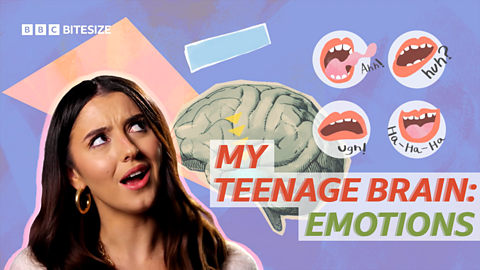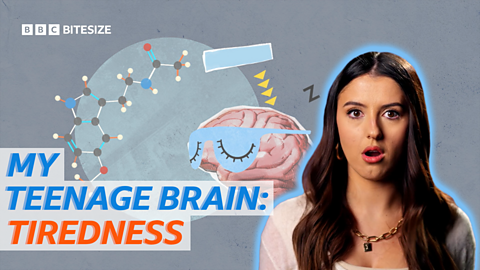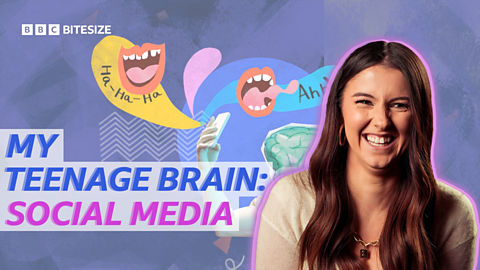Watch India Sasha explain the science behind those family fights!
India: Is it just me? …Or do you ever feel like the adults in your life just aren't on your wavelength? Like, I used to question whether it was normal how much me and my parents wouldn't understand each other.
Well let me just say, don't worry, it is normal! Our teenage years are the bridge between being a child who needs our parents for everything to being a fully independent adult. Which means we get stuck in this weird push and pull between wanting to feel comforted and looked after and wanting to be free and independent.
To help us move away from relying on our parents and our carers our brain pushes us towards peer-to-peer relationships. That's why we prefer to spend more time with our friends.
I mean, I definitely loved a good party. But to the adults in our lives, it can feel like we're rebelling against them, leading to lots of little arguments or even full-blown screaming matches. And yes, okay, we do just want the freedom to do what we want, but part of our brain still cares what our parents and carers think.
Look, getting more freedom as you grow up is actually really important for your development, setting you up to stand on your own two feet. But remember you deserve respectful relationships and so do the adults in your life, So check out our our tips and advice below.
Most teenagers argue with their parents or carers at least at some point during their teen years, but have you ever wondered why?
In the teen brain, the pre-frontal cortex – the part responsible for social processing – is still developing. During this time, you may find yourself wanting to spend more time with your peers and less time with your parents or caregivers. This is because your brain is driving you towards independence as you move towards adulthood.
You might also find yourself acting more impulsively or emotionally during your teenage years – the pre-frontal cortex is also responsible for the more rational and logical type of thinking. There may be challenges and even conflict with your family as you go through your teenage years and begin to move towards independence.
This is natural and part of healthy development and there are some things you can do to help navigate those turbulent teen waters. Here are some videos to help you, along with some words of wisdom from psychologists Dr Glenn Mason and Dr Tara Porter.
Why don't my family get me?
The transition from childhood to adulthood can be difficult for both you and your family. As psychologist Glenn says,
“It can be a challenging time for your family, as you become more independent, and [your parents and carers] can find themselves in a conflict between letting you go and trying to protect and keep you safe. This can be frustrating for you, and because of that, you will likely be communicating with your family from an emotional state. Therefore, your responses are more likely to be reactive rather than from a place of reflection, with insight and perspective.”
Glenn suggests to help manage conflicts during this time, you could try a technique which is known in cognitive behavioural therapy as the STOPP method.
What is the STOPP method?
The STOPP method is a series of steps you can take to try to help you calm down and get some space from conflicts you may be having.
S – Stop and take a moment.
T – Take a breath. This will help regulate your nervous system, which impacts your emotions.
O – Observe what’s going on around you.
P – Perspective is much easier to tap into when you’re calm and your nervous system is regulated.
P – Practice this technique, as it takes time to learn!
How to deal with family arguments
Watch as two teens, Jasmine and Aggy, talk to psychologist Dr Tara Porter about why family arguments might happen.
Aggy: Let's not, let's not just attack teenagers though. Adults lie too. Adults lie.
Jasmine: Turn the tables round.
Tara: We talked about the teenage brain, is really attracted to your peers, your friends. That can be hard for parents and for young people to go through that stage. Were there lots of arguments at that time?
Jasmine: I wouldn't say arguments, probably just like a lack of understanding because I feel like I kind of went through phases at thirteen to fourteen, it was kind of like, I pushed them away a little bit, then we got a little bit closer and then when I started to struggle with my mental health, I found it something, you know, it wasn't as easy to talk to them about as it was to like my friends and I think it is quite easy for parents to take it personally. Like why would you rather you know, speak to your friend about it? Like I'm your parent, I brought you up, like I care about you and I get that. But it was just, they were difficult conversations and that did again kind of create some distance between us. But in the end, I managed to open up a bit more and ended up getting closer again.
Aggy: Yes a lot of arguments, but those arguments actually made the relationship stronger, so it was a blessing in disguise because it allowed us to understand each other more.
Tara: Research shows that teenagers lie a lot to their parents.
Jasmine: No comment.
Aggy: I'll let you take this one.
Tara: In fact, I think it says that ninety-five percent of teenagers lie to their parents.
Aggy: Who finds these statistics?
Tara: I tell you what they've done that research in a number of different countries. I mean often the lies that teenagers tell are lies of omission. They just leave out information.
Aggy: Let's not just attack teenagers. Adults lie too. Adults lie.
Jasmine: Let's turn the tables round.
Aggy: This attack on teenagers is nuts.
Tara: In that research, when they why teenagers lie, mostly the reason they give is because they want to protect their parents. They don't want to upset their parents.
Jasmine: I think it is to like avoid conflict in order to like protect, protect your parents.
It can be difficult to understand how to deal with conflict, and everyone is different in how they manage conflict and how difficult they find it. As we saw from the video, some teens resort to lying to their parents. You might do this to avoid conflict or even to protect your parents, but as Tara says, “Lying isn’t a good strategy! It kind of destroys the trust, so I advise teenagers to try and move into negotiating with their parents.”
As an example, Tara suggests that if you want to go to a party, you could first try explaining to your parents or carers why going to the party is important to you. Communicate about who’s going to the party, what time you’ll leave and how you’re getting home. Try to have a calm conversation instead of a fight, and appreciate that your parents or carers are most likely just worried about your safety.
Being independent as a teenager
Jasmine and Aggy discuss with Tara how this felt for them as teens.
Aggy: Don't drop me right at the party. Like, drop me down the street. I don't want to be seen, I don't want to be seen, being dropped at a party.
Jasmine: Two streets away.
Tara: I often think it's really quite amazing that you know when you first start high school at eleven, most kids are pretty dependent on their parents you know. By the time you get to eighteen, you are completely independent and that's the psychological purpose of teenage years and adolescence is to do that sort of separating and individuating. How has that impacted on you guys?
Aggy: When you enter those teenage years, there comes a point where you want to be more associated with your friends and kind of like break away. That's not cool, mum.
Jasmine: You want your own like personal space and independence.
Aggy: Yeah like, don't drop me right at the party. Like, drop me down the street. I don't want to be seen, I don't want to be seen, being dropped at a party.
Jasmine: Two streets away.
Aggy: I don't want to be seen, I don't want to be seen being dropped at a party.
Tara: You want the lift to the party but you don't…
Jasmine: You want to seem self-sufficient. You don't want anyone to…
Aggy: Yeah drop me down the road.
Tara: As the teen brain develops, it is completely normal to want to separate more from your parents and there will be times when you want to pull away a lot from your parents and there will be times when you want to swing back to be closer to them and that is a normal part of brain development.
Aggy: My mum used to make jokes about that. She used to say, ok so when it comes to going out you want to be grown, but when it comes to doing your laundry, you want to be a baby again. Just a bunch of examples like that and I see that as true. A lot of kids want independence, but they don't want actual independence because if their parent or caregiver now says, ok go pay the bills then, help me with the bills, they will be like no, I'm still a child but you want to go out all night and stuff.
Independence means something different for everybody. In some cases, you might be reliant on your parents or carers for certain parts of your life, and in others, you might have much more experience in being independent.
If you’re having a lot of clashes with your parents or carers about independence, Tara suggests showing how you’re ready for it by doing things like completing your homework without being nagged about it. Perhaps you could do some laundry, or pop to the shop for milk when you notice there’s none in the fridge, or even take over the responsibility of cooking one night. Showing that you can take responsibility for these aspects of adult life helps demonstrate that you can be responsible enough to do the fun things too.
If you’re struggling with communication with your parents or carers, Tara suggests you try reaching out to other adults in your life like teachers, older siblings or family members. They might be able to give you advice on how to communicate with your parents or carers in a healthy and productive way.
If you need support
You should always tell someone about the things you’re worried about. You can tell a friend, parent, guardian, teacher or another trusted adult. If you're struggling with your mental health, going to your GP can be a good place to start to find help. Your GP can let you know what support is available to you, suggest different types of treatment and offer regular check-ups to see how you’re doing.
If you’re in need of in-the-moment support you can contact , where you can speak to a counsellor. Their lines are open 24 hours a day, 7 days a week.
There are more links to helpful organisations on ±«Óătv Action Line.
You can find out more about the teenage brain here...
My Teenage Brain: Why am I so emotional?
Do you ever feel like you're on an emotional rollercoaster? Learn about why your feelings might feel so intense and some top tips about helping manage your emotions.

My Teenage Brain: Why am I so tired?
Feeling tired and you don't know why? Learn about why teenagers have a different sleeping pattern to others and get some advice on how to get better sleep.

My Teenage Brain: Why can't I stop scrolling?
For some top tips on breaking your scrolling habit!
